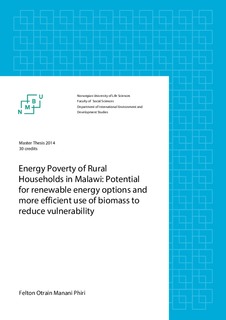| dc.contributor.author | Phiri, Felton Otrain Manani | |
| dc.date.accessioned | 2015-03-16T10:15:36Z | |
| dc.date.available | 2015-03-16T10:15:36Z | |
| dc.date.copyright | 2014 | |
| dc.date.issued | 2015-03-16 | |
| dc.identifier.uri | http://hdl.handle.net/11250/279307 | |
| dc.description.abstract | Most of the people in Malawi live in rural areas and are poor, depend on rain-fed subsistence agriculture and use traditional biomass as a source of energy. In the face of changing climate this dependence on rain-fed agriculture and traditional biomass makes them to be more vulnerable. Furthermore, reliance on biomass as a source of energy degrades the environment and also cause human suffering thereby increasing their vulnerability. A number of interventions are being put in place by Malawi government and other stakeholders to reduce vulnerability of the rural poor. One of such is rural electrification using stand-alone renewable energy technologies such as solar home systems which are hoped to positively transform livelihoods through provision of efficient and reliable energy.
This study explores the potential for using renewable energy options in reducing people’s vulnerability and also how efficient use of biomass can reduce vulnerability and limit deforestation in Malawi. The research focuses on solar energy and efficient use of biomass through improved cookstoves. The issue of reducing vulnerability is addressed by looking at how use of solar energy and improved cookstoves improve people’s adaptive capacity. The study also looks at whether Malawi’s current energy policy promotes use of renewable energy. It uses Sustainable Livelihoods Framework by DFID.
The study is carried out in Chitala and Chimonjo villages, Salima district, Malawi. The sample is made of beneficiaries of the solar electrification project that was implemented in the two villages by the Barefoot College, India, and relevant key informants. The study uses mixed methods research in data collection and analysis.
The study shows that use of solar energy in the two villages has improved the health, income, education, and social life of participants. It also shows that both solar energy and improved cookstoves have environmental benefits. Furthermore, Malawi’s current energy policy has increased access to and use of renewable energy.
The paper concludes that use of solar energy and efficient use of biomass reduces people’s vulnerability to climate change. Efficient use of biomass has been found to reduce deforestation in Malawi. Furthermore, both solar energy and improved cookstoves mitigate climate change. Lastly, Malawi’s current energy policy promotes use of renewable energy. | nb_NO |
| dc.description.sponsorship | NORAGRIC | nb_NO |
| dc.language.iso | eng | nb_NO |
| dc.publisher | Norwegian University of Life Sciences, Ås | |
| dc.rights | Navngivelse-Ikkekommersiell-IngenBearbeidelse 3.0 Norge | * |
| dc.rights.uri | http://creativecommons.org/licenses/by-nc-nd/3.0/no/ | * |
| dc.subject | Renewable energy | nb_NO |
| dc.subject | Solar energy | nb_NO |
| dc.subject | Vulnerability | nb_NO |
| dc.subject | Biomass | nb_NO |
| dc.subject | Energy poverty | nb_NO |
| dc.title | Energy poverty of rural households in Malawi : potential for renewable energy options and more efficient use of biomass to reduce vulnerability | nb_NO |
| dc.type | Master thesis | nb_NO |
| dc.subject.nsi | VDP::Social science: 200 | nb_NO |
| dc.subject.nsi | VDP::Technology: 500::Environmental engineering: 610 | nb_NO |
| dc.source.pagenumber | 171 | nb_NO |
| dc.description.localcode | M-DS | nb_NO |

